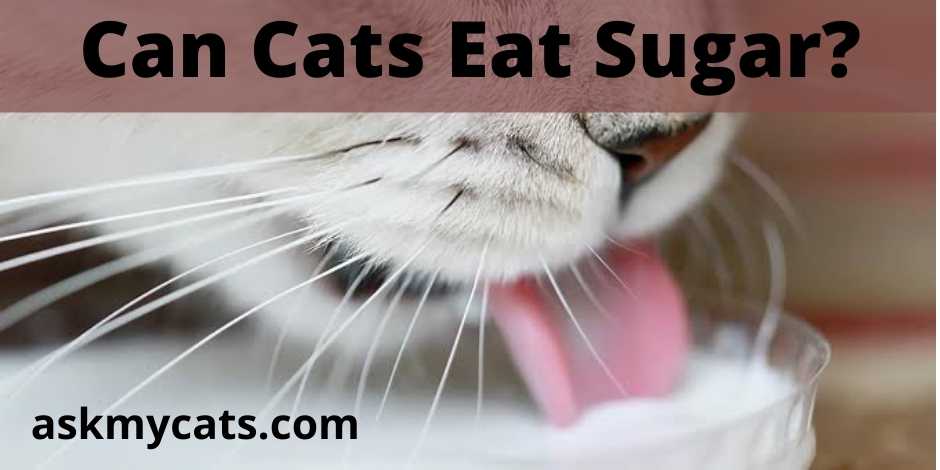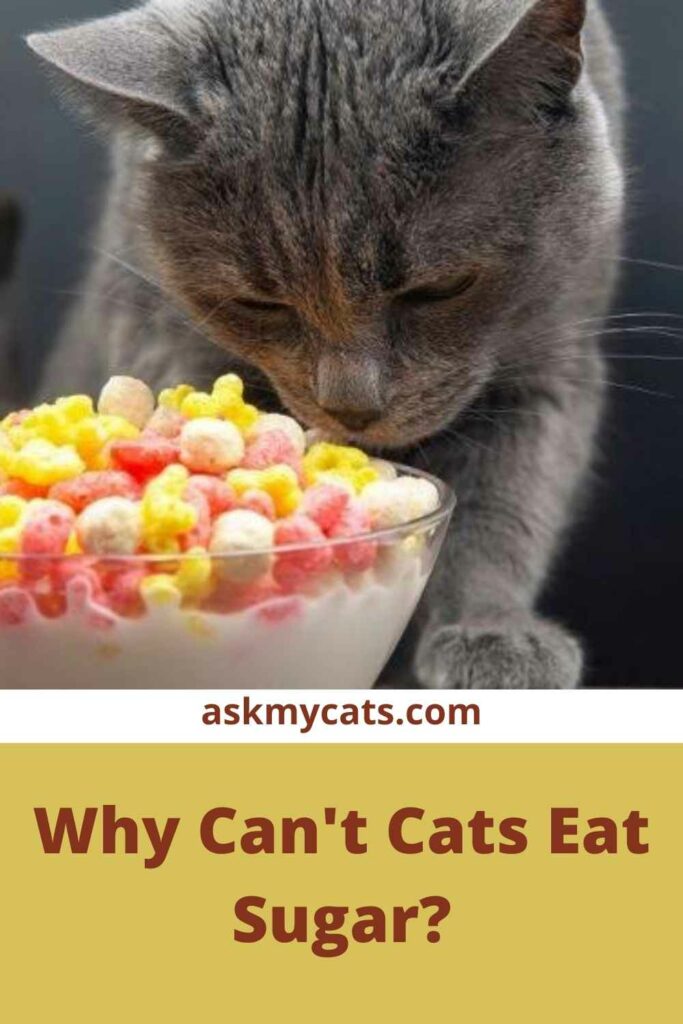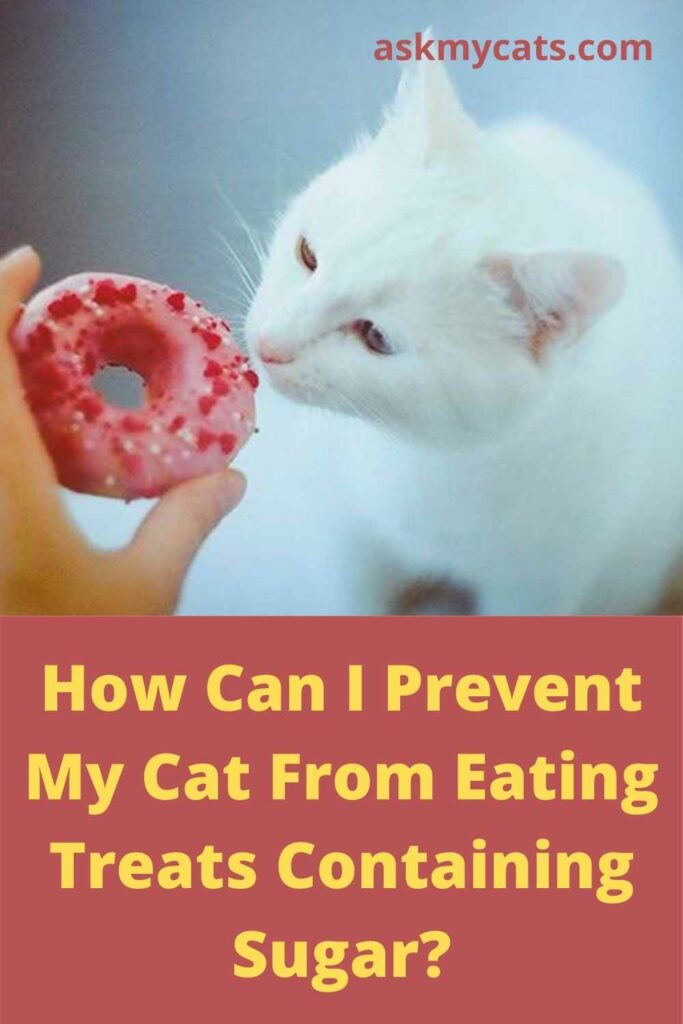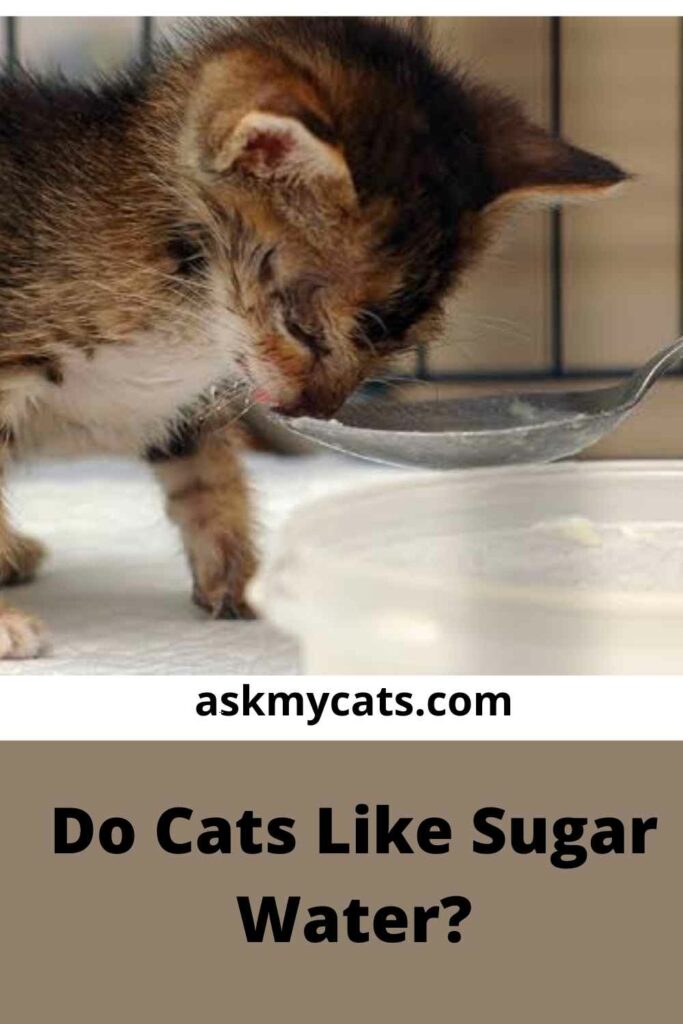You come home and notice your cat nibbling on some treats or candies. You get concerned that your cat is having a sweet tooth and wonder if it is healthy for her. While she cannot taste sugar, she is fond of foods with high fat and salt.
Even though sugar isn’t instantly harmful to your cat, you shouldn’t give it to her. It can lead to a slew of health issues in the future. To avoid problems, give her as little sugar as possible.
If you want to learn more about your feline friend’s eating habits and their consequences, keep reading.


Give Your Cat the Perfect Day
Get the Free Ebook!
Do Cats Like Sugar?
As carnivores’ existence did not rely on their capacity to detect sugars, genetic changes made some of them tasteless. Cats cannot taste sweet, and therefore, are unaffected by sugar.
It is a matter of survival for most animals to be able to recognize carbs. Simple sugars have a sweet flavor because we require them for our nutrition. That’s why most animals find sugar to have a pleasant taste.
House cats and other felines, on the other hand, are uninterested in sweets. Although cat owners may say that their pets adore ice cream and pastries, it is the fat in the treat they prefer to eat rather than sweetness.
Sweet taste receptors are encoded by two genes that code for two proteins, both of which play a role in our capacity to appreciate sugary foods.
One of these genes appears to have been damaged in cats due to a fortuitous mutation, and the broken version has survived.
What Happens If A Cat Eats Sugar?
Sugar, believe it or not, isn’t something your cat enjoys. They are unable to detect sweetness because they lack the ability to taste it.
Sugar should not be harmful to your cat if consumed in little amounts. However, if your pet eats sugar in high amounts, you may see vomiting, diarrhea, and other symptoms.
Depending on your cat’s sensitivity and what they ate, symptoms might range from minor to severe. Sugar intake can also result in weight gain, diabetes, tooth decay, and other health concerns in the long run.
How Does Sugar Affect Cats?
Although sugar has not been proven to be harmful to cats, it does pose a danger to obesity and diabetes.
Sugar is a source of empty energy for everyone, meaning it merely gives energy to the organism and has no nutritional value (no fibers, vitamins, minerals). However, cats, like people, may become more lively and restless because of sugar.
Can Cats Digest Sugar?
Sugar is indigestible to cats. They lack components that allow them to enjoy (and digest) sweets, such as glucokinase, a crucial enzyme in the liver that regulates carbohydrate metabolism and prevents glucose from overwhelming the animal.
Despite this, the majority of large pet food companies use corn or other grain products in their foods. Cats may get diabetes as a result of this. Carbohydrates make up around 20% of today’s cat diet.
Also, chek out can cats have ice cream
Why Can’t Cats Eat Sugar?
Consuming excess sugar may be detrimental to a cat’s health. It may lead to a variety of diseases.

1. Diabetes
Cats, like people, may suffer from illnesses such as diabetes. Sugar would be extremely harmful to their health if they consumed it in high amounts.
They may not be able to detect the sugar, but it does not rule out the possibility that it is dangerous. For the protection of their health, your cat should not consume any sugar at all.
If your cat has diabetes, be sure that you provide them an insulin shot after they’ve eaten. This sort of therapy will save your cat from developing more serious health issues, such as a damaged liver.
2. Obesity
Ordinary table sugar is devoid of nutrition, delivering calories but not the nutrients your cat requires to be healthy. Because adult cats only require a few hundred calories per day, sugar’s empty calories quickly pile up, potentially leading to obesity and other health problems.
Obesity makes it difficult for your cat to have a happy life since they can’t enjoy exercising as much as they used to. This lowers their quality of life and may lead to additional health problems.
Obesity increases the risk of osteoarthritis, insulin resistance, type 2 diabetes, and certain malignancies in cats. It also raises the risk of a heart attack or stroke, and it can lead to diabetes in particular. If your cat is already overweight, you should avoid adding it to their diet.
3. Oral Problems
Although there have been differing views on whether sugar has a detrimental impact on your cat’s dental health, it’s likely that, like people, too much sugar can harm your cat’s oral health.
Sugar may raise your cat’s risk of developing cavities, gingivitis, and other dental diseases.
If bacteria enter your cat’s circulation, they can spread throughout their body, infecting their liver, kidneys, and heart.
You should strive to safeguard your cat’s teeth by avoiding giving them sugar, especially if you do not brush your cat’s teeth on a daily basis.
To minimize future health issues, you should feed your cat as little sugar as possible.
Is Sugar Harmful To Cats?
Sugar is not harmful to cats, so if your cat eats some sugary cereal or a smidgeon of syrup or frosting, you won’t have to run to the doctor.
However, because it is still junk food, it is not good for your cat’s long-term health. You should try to keep sugar out of your cat’s diet as much as possible.
Also, check out can cats eat candy
Can Cats Have Processed Sugar?
Sugar is not poisonous to cats. However, even if they’re available in processed form, it’s not really healthy for them.
Table sugar and contemporary sweeteners are not natural to cats, and cats have a difficult time digesting sugar.
If your pet consumes processed sugar, he or she may have vomiting, diarrhea, and discomfort. Depending on how sensitive your cat is and what they ate, symptoms might range from mild to severe.
Sugar intake can also lead to weight gain, diabetes, tooth decay, and other health concerns in the long run.
Can Cats Get A Sugar Rush And Become Hyper?
Yes, cats may experience a sugar rush, which may cause them to become hyper and agitated. Cats, in general, are prone to high blood sugar, which can reach 300-400 mg during stressful situations.
This is usually caused due to a transient rise in blood sugar, and while it should be monitored, it may not be a reason for a diagnosis of persistent hyperglycemia or diabetes mellitus.
However, if the elevated sugar is considered to be transient, hormonal, or stress-induced hyperglycemia, your cat may not display any significant symptoms.
Can Cats Get Addicted To Sugar?
Yes, sugar, which is present in cat snacks, may cause addiction in cats. Cats are naturally programmed to want high-fat, high-salt diets, which the pet food business has taken advantage of.
To encourage that addiction, cat food manufacturers add salt, fat, and sugar to enzyme-dead dried kibble. Cats can even grow hooked to their food’s form and feel, making switching to a healthy diet difficult.
A reason why cats may be hesitant to try new foods is that they suffer from poor digestion and a stomach that feels “yucky” which is similar to how acid reflux and other digestive problems make individuals feel.
Cats who eat a high-carbohydrate diet and have a weak digestive system are more likely to get sick.
How Can I Prevent My Cat From Eating Treats Containing Sugar?

The sort of food your cat eats determines her life and well-being. You can help her stay healthy by keeping sugary treats out of her reach and ensuring she eats a well-balanced diet.
Here are a few simple ways to keep your cat from eating goodies that are high in sugar:
- Keep items out of your cat’s reach. For an inquisitive kitty, installing cat-proof locks on cabinets may be required.
- Do not permit your cat to sit on the counter while you cook or dine.
- Avoid feeding her table scraps.
During the holidays, it’s especially vital to be more aware. There’s probably more tempting human food around, many of which might upset your cat’s stomach or even hurt her.
Take your cat to your veterinarian right away if you see or believe she has eaten one of these items. While some of these foods may cause a little discomfort in your cat, some can be quite harmful to her health.
It is recommended that you consult a veterinarian if your cat consumes something it should not have.
Do Cats Like Sugar Water?

When it comes to our cats, sugar water may be a double-edged sword.
From a medical standpoint, the benefits of utilizing sugar include the fact that if your cat experiences a sudden loss of appetite or a loose or weak bowel movement, the immediate-short term treatment is to provide them sugar water.
Add one scoop of sugar to half a glass of water and give it to your cat. If they don’t drink it on their own, use a feeding syringe to gently place it in your cat’s mouth.
This will provide your cat with a safe surge of energy, allowing it to make it to a journey to the clinic.
Sugar water can be utilized as a reward or even as an incentive when it comes to feeding. If your cat appears to love sweet foods and has demonstrated excellent behavior, you can offer them a pleasant treat of sugar water.
Because you can regulate the amount of sugar, this is the finest sweet treat you can give. Similarly, if your cat refuses to eat, you may get them to eat by combining their food with a touch of sugar water.
However, here is where moderation comes into play. While sugar is healthy for cats, it does not provide much nourishment for your cat. It adds little nutritional value to your cat’s diet.
As a result, the more sugar water you give your cat, the more empty calories you give them. Allowing too many empty calories into your cat’s diet makes them prone to health concerns like obesity, which leads to more serious illnesses like diabetes and even heart attacks.
Sugar is also harmful to your cat’s teeth. Cats’ oral health is highly essential, and if too much sugar is given to your cat, it may rot away their teeth, causing your kitty pain.
Frequently Asked Questions
Can Cats Process Sugar?
Cats lack components that hinder their ability to enjoy (and digest) sweets, such as glucokinase in the liver. It is a crucial enzyme that regulates carbohydrate metabolism and prevents glucose from overwhelming the animal.
What Foods Should Cats Avoid?
Avoid feeding the following to your furry companion:
Alcohol
Chocolate
Tea, coffee and energy drinks
Cheese and milk
Fat trimmings
Raw eggs and raw fish
Grapes and raisins
Onions and garlic
Can Cats Eat Cheese?
Lactose intolerance affects the majority of cats. Their digestive system is unable to handle dairy meals, resulting in digestive distress and diarrhea.
Final Words
Sugar is not harmful or dangerous, therefore a small amount will not kill your cat.
If your cat likes it, it’s fine to feed them a small amount from time to time. However, it’s critical not to give them too much.
Even though it is neither harmful nor dangerous, too much sugar might cause health issues. Oral health issues, obesity, and diabetes are all examples of this.
It’s better to offer your cat as little as possible to keep them healthy. Because they can’t taste it, they’re unlikely to be bothered by the absence of it.
If you have any other questions regarding your feline friend, feel free to drop them in the comment section below.
